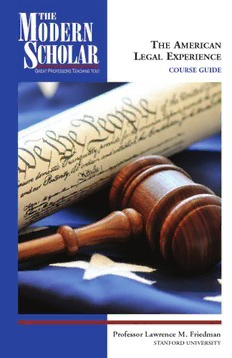
The American legal experience PDF
Preview The American legal experience
T A HE MERICAN L E EGAL XPERIENCE COURSE GUIDE Professor Lawrence M. Friedman STANFORDUNIVERSITY The American Legal Experience Professor Lawrence M. Friedman Stanford University RecordedBooks™isatrademarkof RecordedBooks,LLC.Allrightsreserved. TheAmericanLegalExperience ProfessorLawrenceM.Friedman (cid:1) ExecutiveProducer JohnJ.Alexander ExecutiveEditor DonnaF.Carnahan RECORDING Producer-DavidMarkowitz Director-MatthewCavnar COURSEGUIDE Editor-JamesGallagher Design-EdwardWhite Lecturecontent©2004byLawrenceFriedman Courseguide©2004byRecordedBooks,LLC 7 2004byRecordedBooks,LLC Coverimage:©Photos.com #UT026ISBN:978-1-4025-5788-0 Allbeliefsandopinionsexpressedinthisaudio/videoprogramandaccompanyingcourseguide arethoseoftheauthorandnotofRecordedBooks,LLC,oritsemployees. CourseSyllabus TheAmericanLegalExperience AboutYourProfessor......................................................................................................4 Introduction......................................................................................................................5 Lecture1 IntroductiontotheAmericanLegalSystem ..............................................6 Lecture2 TheColonialLegalExperience..................................................................9 Lecture3 CriminalJusticeintheColonialPeriod....................................................12 Lecture4 RevolutionandtheNewRepublic............................................................15 Lecture5 LawandEconomicDevelopmentintheNineteenthCentury..................18 Lecture6 BlackandWhite:SlaveryandItsAftermath intheNineteenthCentury........................................................................21 Lecture7 TheOtherAmericans:NativesandImmigrants......................................24 Lecture8 FamilyLaw ..............................................................................................28 Lecture9 CrimeandPunishmentintheNineteenthCentury..................................32 Lecture10 ConflictandStruggle:LaborandSocialLegislation................................36 Lecture11 CrimeandPunishmentintheTwentiethCentury....................................39 Lecture12 TheRiseoftheWelfare-RegulatoryState ..............................................43 Lecture13 RaceRelations,CivilRights,andCivilLiberties intheTwentiethCentury..........................................................................46 Lecture14 Culture,Policy,andLawintheLateTwentiethCentury..........................50 CourseMaterials............................................................................................................54 3 man Fried M. Lawrence of ourtesy ABOUT YOUR PROFESSOR Photograph Lawrence M. Friedman ProfessorFriedmanistheMarionRiceKirkwoodProfessorofLawat StanfordLawSchool.HereceivedhisABin1948,hisJDin1951,andan LLMin1953,allfromtheUniversityofChicago. ProfessorFriedmanservedonthefacultiesofSt.LouisUniversityandthe UniversityofWisconsinbeforehisarrivalatStanfordin1968. HehasservedasPresidentoftheAmericanSocietyforLegalHistory, PresidentoftheLawandSocietyAssociation,andPresidentoftheResearch CommitteeontheSociologyofLaw,InternationalSociologicalAssociation. Amonghismanyawardsandhonors,ProfessorFriedmanisthewinnerof theAmericanBarFoundationResearchAward(2001),theSilverGavel AwardoftheAmericanBarAssociation(1994),andtheHarryKalvenPrize forDistinguishedResearchonLawandSocietyfromtheLawandSociety Association(1992).Heisalsotherecipientoffivehonorarydegreesfromuni- versitiesintheUnitedStatesandelsewhere. ProfessorFriedmanhaswrittenmorethantwentybooksonawiderangeof legalsubjects.TheseincludeAHistoryofAmericanLaw,LawandSociety: AnIntroduction,YourTimeWillCome:TheLawofAgeDiscriminationand MandatoryRetirement,TheHorizontalSociety,CrimeandPunishmentin AmericanHistory,andAmericanLawinthetwentiethCentury.Professor Friedmanhasalsopublishedover150articlesandpapersforprofessional lawjournalsandpublications. 4 Introduction ThelegalsysteminAmericaisthebasisoffreedomasweknowittoday. Thesystemisbased,ultimately,onthecommonlawofEngland,butithas grown,developed,andchangedovertheyears. AmericanlawhasbeenacriticalfactorinAmericanlifesincecolonial times.Ithasplayedaroleinshapingsociety,butsociety—thestructure,cul- ture,economy,andpoliticsofthecountry—hasdecisivelyshapedthelaw. Throughhistory,thelegalsystemhasbeenintimatelyinvolvedwithevery majorissueinAmericanlife:racerelations,theeconomy,thefamily,crime, andissuesofequalityandjustice. ThetruestrengthoftheAmericanlegalsystemliesinitsabilitytoadaptto newanddifficultissues. 5 Lecture1: IntroductiontotheAmericanLegalSystem Beforebeginningthislectureyoumaywantto... ReadLawrenceM.Friedman’sAHistoryofAmericanLaw,pp.1–19. WhatIsaLegalSystem? Therehavebeenmanyattemptstodefine“law”and“legalsystem.”Thereis noexact,agreed-upondefinition.Therearedifferentdefinitions,depending ondifferentpurposes.Lawcanbeformalorinformal;itcanbeofficialornon- official.Everylargeinstitution,suchasabigcorporation,university,orhospi- tal,hasakindofinternal“legalsystem”(thatis,rulesandregulations,and waystoenforcethem). Wewillfocus,however,onlawthatis“official”(thatis,connectedtothe stateorgovernment).Allofushaveatleastsomeideaofwhatwemean whenwetalkabout“thelaw”or“thelegalsystem.”Wethinkofstatutes passedbyCongressorthelegislaturesofthestates;rulesandregulationsof administrativeagencies;municipalordinances;and,verysignificantly,doc- trinesanddecisionsofcourts.Itallconstitutesavastbodyofdosanddon’ts. Wealsothinkofthepeopleandinstitutionswhomakeandenforceandinter- pretthelaws:membersofCongress,cityaldermen,statesenators,judges andjustices—andalsothepolice,lawyers,prisonofficials,andcountless membersofthecivilservice. Itisobvious,whenwethinkofthesysteminthisway,thatithasenormous importanceinourlives.Thelegalsystemaffectsalmosteverythingwedo— drivingacar,goingtowork,buyingclothesinadepartmentstore.Thereisa thicknetworkofrulesandregulationscoveringalmosteveryaspectoflife— businesslife,worklife,evenprivatelife(lawsofmarriage,divorce,andchild custody,forexample).Hastherealwaysbeensodenseanetwork?Howdid thissystemevolveintheUnitedStates?Whydoweneedalltheserules,if wedo?Thisseriesoflecturesisanattempttoanswerthesequestions.The lecturesrestononebasicassumption:thelegalsystemis,basically,aprod- uctofsociety.Itsindependenceislimited.Political,economic,andcultural forcesdetermineitsshapeanditscontent. Everycountry,ofcourse,hasalegalsystem.Notwolegalsystemsarethe same.Therearedifferentwaysofclassifyingthelegalsystemsoftheworld. Onemethodclassifiesthembytheirancestryinamannersomewhatanalogous tolanguage.Usingthismethod,wefindtwogroupsoflegalsystemofparticular importance.ThecivillawsystemcoversalmostallofEurope,LatinAmerica,and partsofAsiaandAfrica.ThesesystemsrestonabaseofRomanlaw,asitwas E rediscoveredandrevivedintheMiddleAges.Startingabout200yearsago, N O thesesystemsbegantoarrangetheirfundamentalrulesintheformofcodesof E law.TheFrenchandGermanCivilCodeshavebeenparticularlyinfluential. R U Fromthenineteenthcenturyon,anumberofcountriesthatwantedtomodern- T C izeadoptedcivillawsystems—notablyJapanandTurkey. E L 6 Onecountryresistedthe“reception”ofRomanlawinEurope.Thiswasthe islandkingdomofEngland.Itretaineditsownnativesystem,theso-called commonlaw.Civillawwasinfluential,butneversucceededinreplacingthe commonlaw.ThenEnglandbecameamightyempire,andthecommonlaw spreadtoEnglishcolonies,andthecoloniesofcolonies.Hencethecommon lawisthebasisofthelawofCanada(outsideQuebec),AustraliaandNew Zealand,otherEnglishspeakingcountries,suchasJamaicaandBarbados, andmanyoftheformercoloniesinAfricaandAsia.Itisalsothebasisofthe lawoftheUnitedStates(Louisianaisabitofanexception,becauseofits heritageofFrenchlaw). WhatIsDistinctiveAbouttheCommonLaw? Manycharacteristicssetoffthecommonlawfromthecivillaw—detailsof procedureandalsoofsubstance.Also,thecommonlawisnotacodifiedsys- tem.Inessence,commonlawhasbeenjudge-madelaw;judges,inthe courseofdecidingactualcases,createdthebasicprinciplesanddoctrinesof thecommonlaw.Thedecisionsofappellatecourts,reportedinthehundreds ofvolumesthatlinetheshelvesoflawschoollibraries,aretheheartofthe commonlawsystem. Therearemanyothertraitsthatsetitofffromtheotherlegalsystemsofthe world.Thereis,forexample,theinstitutionofthejury.Mostcivillawsystems donothaveajury;judgesdecideonguiltorinnocence,forexample. Commonlawprocedureisstronglyoralinnature.Thefamiliardramaofthe courtroom,dominatedbylawyersandconsistingofwitnesseswhoareexam- inedandcross-examined,isspecificallycommonlaw.Thecivillawsystems, historically,leanedmoreheavilyonwrittendocuments,andavoidedthedra- matic,lawyer-dominatedtrialsofthecommonlaw. Withinthecommonlawworld,theAmericanlegalsystemhasitsownpecu- liarities.Foronething,itisafederalsystem:aclusterofstates,eachof whichissovereigninmanywayswithinitsborders,andcontrolssuchmatters asordinarycrimes,education,commerciallaw,andfamilylaw.TheUnited Statesalsohasawrittenconstitutionandjudgeswhocanreviewtheworkof otherpartsofthegovernment.Someofthesestructuraltraitsweredeveloped afterindependence.Buttheseedsofadistinctivelegalsystemweresown duringthecolonialperiod,whichisthesubjectofthenexttwolectures. 7 FORGREATERUNDERSTANDING (cid:1) Questions 1.WhatmakeslawsuchacentralpartofAmericanlife? 2.CompareAmericanlawandBritishlaw.Aretherefundamentalsimilarities? Whataretherootsofthedifferences? Suggested Reading Friedman,LawrenceM.AHistoryofAmericanLaw.2nded.NewYork: Simon&Schuster,1985. Other Books of Interest Hall,Kermit.TheMagicMirror:LawinAmericanHistory.NewYork:Oxford UniversityPress,1990. Kagan,RobertA.AdversarialLegalism:TheAmericanWayofLaw. Boston:HarvardUniversityPress,2003. Tyler,TomR.WhyPeopleObeytheLaw.NewHaven:YaleUniversity Press,1992. E N O E R U T C E L 8 Lecture2: TheColonialLegalExperience Beforebeginningthislectureyoumaywantto... ReadLawrenceM.Friedman’sAHistoryofAmericanLaw,chapter2. TheColonistsandTheirLaw English-speakingpeoplearrivedontheAtlanticCoastintheearlyseven- teenthcentury.Theyfoundedsettlementsallalongthecoast.Theywerenot theonlysettlersinwhatisnowtheUnitedStates.ThereweretheDutchin NewYork,theSpanishinFlorida,andNativeAmericanpeoplesthroughout thearea.TheEnglishpushedouttheDutchanddisplaceditslegalsystem; theyignored,byandlarge,thelegalsystemsofthenativetribes. Thecolonistsbroughtwiththemthecommonlaw.Itwastheonlylawthat theyknewandunderstood.Butthelegalinstitutionsthattheysetupwere verydifferentfromtheinstitutionsinEngland.Inthefirstplace,Englishlaw wasverycomplexandhadmanylocalvariants;someofthesevariantshad specialimpactoncoloniallaw.Butmostly,Americanlawveeredoffinitsown directionsbecauseofthevastdifferencesbetweenthecolonialsituationand theEnglishsituation.Theearlycoloniesweresmall,precariouscommunities. Theywerealso,inmanycases,deeplyreligiousandeventheocraticcommu- nities.Theirlawwasshotthroughwithrulesandinstitutionsthatreflected theirsize,aims,andtheirreligiousheritage.Thatheritagewasinmany coloniesnotthesameastheestablishedchurchofEngland. Everycolonyhadasystemofcourts.Thecoloniesdidnotreproducethe complexjungleofoverlappingandconfusingjurisdictionsthatexistedin England;theysimplifiedgreatly.Ingeneral,thecolonialcourtswerecheap, accessible,andhandledawiderangeofbusiness.Theywerenotjust “courts”inthemodernsense;theyhandledalotofwhatwewouldcalladmin- istrativeandlegislativework,alongwiththeordinaryworkofsettlingdisputes. Peopleenteredwillsanddocumentsincourts;theyregisteredearmarks.The courtswerereallybasicinstitutionsofgovernmentforthecolonies.Thelaw theyapplied,however,wasalsomuchsimplerandmorestreamlinedthanthe lawofEngland,bothinsubstanceandprocedure. Thecolonieswere,inmanyways,functionallyindependent.Theywerepart ofanempire,butthecapitaloftheempirewasthousandsofmilesaway, acrossavastocean.Travelwasslowandprecarious,andtheBritishhadyet todeveloparealsenseofhowtogoverncolonies.Intheory,colonialstatutes (forexample)couldbedisapprovedinLondon,butthiswasnotcommon,and inanyevent,tookyearstooccur. Thecolonieswerehardlyexperimentsinlaissez-faire—theideasofAdam Smithwerefarinthefuture.Thecolonialauthoritiestriedtomaintainagrip ontheeconomy—onlabor,prices,andthequalityofcommodities.Theycon- trolled,forexample,thepriceandsizeofbreadandotherstapleproducts. 9
